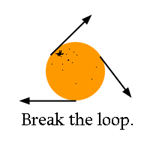

 | Tangentium |
March '04: Menu
All material on this site remains © the original authors: please see our submission guidelines for more information. If no author is shown material is © Drew Whitworth. For any reproduction beyond fair dealing, permission must be sought: e-mail drew@comp.leeds.ac.uk. ISSN number: 1746-4757 |
May 2004: Anarchism, Activism and ITIntroductionThere are many ways to think about politics, and how we think about it influences what we actually see. One approach is to take what could be called a macropolitical perspective, where emphasis is placed on global processes. The entities or institutions which dominate such an approach are large and bureaucratic: liberal-democratic states, multinational corporations, global financial institutions such as the World Bank, and so on. At this scale, information technology seems completely bound up with the same global processes which gave rise to it in the first place. Without IT, globalisation could not have occurred. In this worldview it seems anomalous, maybe even futile, to talk about IT as something which might undermine, or at least help hold back, the inexorable march of globalisation and liberal democracy. But this is not the only way to think about politics. In opposition to globalised macropolitics there is micropolitics. These are the politics of the local neighbourhood, the community or residents' organisation, the volunteers on a campaign, the family and the individual. The scale may be immeasurably smaller, but the motivations are arguably stronger and more meaningful to participants. Politics at this level is hard to abstract into a vote, or even other "formal" methods of political pressure such as lobbying or the mass media (which is itself a global entity, bureaucratic and impersonal in form). Rather, it is immediate, personal and autonomous. This month's Tangentium asks what IT can do to help - or retard - this kind of politics. The political philosophy which is most relevant is anarchism, and this is explored in the supplementary essay by James Black. This provides a philosophical background to the two feature essays which explore the place of IT in political activism. Drew Whitworth's Networking Democracy: IT and Radical Infrastructures investigates the relationship between how computers are networked, and how people associate; assumptions made about organisations will influence the computer networks which emerge from them, and in principle one can envisage a democratic approach to the design of computer systems which would help their being used by activist networks. However, as Whitworth points out, many opportunities to build links between the IT community and "radical infrastructures" were missed in the past. Asa Winstanley's The Limits of Free Software criticises the over-emphasis on free and open source software when so many inequalities and injustices remain in global society. He describes some ways in which genuine autonomy can be promoted through the use of IT, rather than assuming that free software will solve all the problems he identifies. As usual, we also present definitions of key terms, annotated links and some quoted snippets for readers' perusal. | |